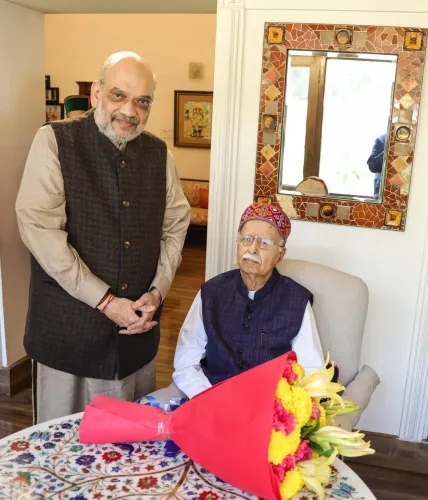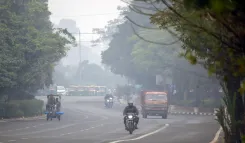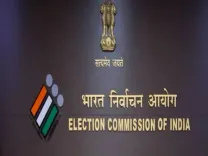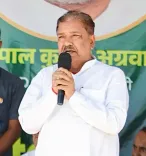Will India Present Its Position Before the IMF Regarding Pakistan's Bailout Package?
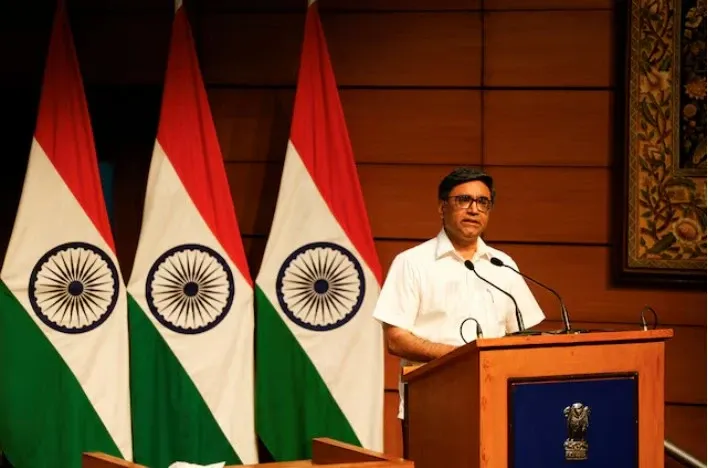
Synopsis
Key Takeaways
- India will present its case at the IMF regarding Pakistan's bailout packages.
- Foreign Secretary Vikram Misri will articulate India's stance.
- Concerns raised about the misuse of IMF funds by Pakistan.
- Pakistan is facing a severe economic crisis, relying on IMF support.
- The timing of the IMF review is sensitive due to recent military actions.
New Delhi, May 9 (NationPress) India is set to present its stance during a board meeting at the International Monetary Fund in Washington this Friday, as confirmed by Foreign Secretary Vikram Misri. This meeting comes in response to inquiries about New Delhi's request for a review of the financial assistance provided to Pakistan.
On Thursday, Foreign Secretary Misri stated that India's executive director at the IMF will articulate the country's position at this crucial meeting of the financial institution. He emphasized, "I am confident that our executive director will highlight India's perspective."
While the board's decisions remain independent, he believes that the situation regarding Pakistan's financial dealings should be evident to those who generously provide bailouts to the nation.
Misri pointed out that numerous bailout packages from the IMF to Pakistan have failed to achieve successful outcomes. Currently, Parameswaran Iyer, the Executive Director at the World Bank, is overseeing this responsibility following the removal of K.V. Subramanian as the IMF Executive Director.
Pakistan has obtained several bailout packages over the last decade, including a $7 billion loan approved in September 2024, with $1 billion already disbursed. Additionally, a $1.3 billion loan related to climate change was greenlit by the IMF in March 2025.
These loans come with conditions that require the recipient nations to implement structural economic reforms.
Foreign Secretary Misri expressed strong criticism regarding Pakistan's utilization of IMF funds, alleging that such financial support indirectly aids Pakistan in funding military intelligence operations, including groups like Lashkar-e-Taiba (LeT) and Jaish-e-Mohammed (JeM).
He remarked, "Pakistan's reputation as a hub for global terrorism is marked by several incidents... I need not remind anyone of where Osama Bin Laden was located and who labeled him a martyr."
Misri also highlighted the presence of numerous terrorists, including those sanctioned by the UN, who continue to operate within Pakistan's territory.
This statement from Misri comes amid escalating concerns that financial aid to Pakistan might be used to support its ongoing cross-border terrorism activities, especially against India.
Currently, Pakistan is grappling with a significant economic crisis and heavily relies on IMF support through its Extended Fund Facility (EFF). The IMF's review today will determine if Pakistan meets the necessary criteria to access the next funding tranche. This review's timing is particularly sensitive, following India's recent "Operation Sindoor" which targeted terrorist camps in Pakistan and Pakistan-Occupied Kashmir.
This situation has intensified India's calls for a reassessment of the financial assistance provided to Pakistan. The recent escalation in tensions between India and Pakistan was triggered by the deadly Pahalgam terror attack in Kashmir on April 22. Misri noted that this incident marked the onset of increasing hostilities between the two nations.
Despite Pakistan's denial, Misri stated that the terror group responsible, The Resistance Front (TRF), took public responsibility for the attack. He also pointed out that Pakistan protested the mention of TRF in a UN Security Council statement regarding the attack, reflecting ongoing efforts by Pakistan's authorities to obscure their support for terrorist groups.
Misri reiterated that India's response was not aimed at escalating tensions, stating, "We only responded to the April 22 terror attack in Pahalgam."
The longstanding support from Pakistan for terrorist organizations like LeT and JeM continues to be a major point of discord between the two countries. Misri emphasized that Pakistan's actions have destabilized the region, contributing to global terrorism.
He also reminded the international community of Pakistan's role in harboring terrorists responsible for numerous high-profile attacks worldwide. In his statements, Misri noted that both Pakistan's Defence Minister Khwaja Asif and the former Foreign Minister have recently acknowledged their country's involvement with terrorist groups, further validating India's standpoint.
Military tensions between India and Pakistan remain high, with both nations consistently targeting each other’s military installations. During a joint press briefing from the Ministry of External Affairs (MEA) and security forces, Colonel Sofia Qureshi of the Indian Army confirmed that Pakistan attacked multiple military sites in northern and western India on the nights of May 7 and May 8.
The Foreign Secretary's remarks come amid rising tensions following New Delhi's military strikes on Wednesday against terrorist infrastructure within Pakistan and Pakistan-Occupied Kashmir.




